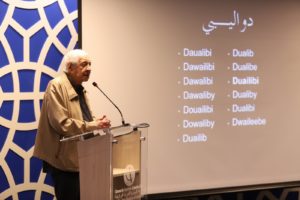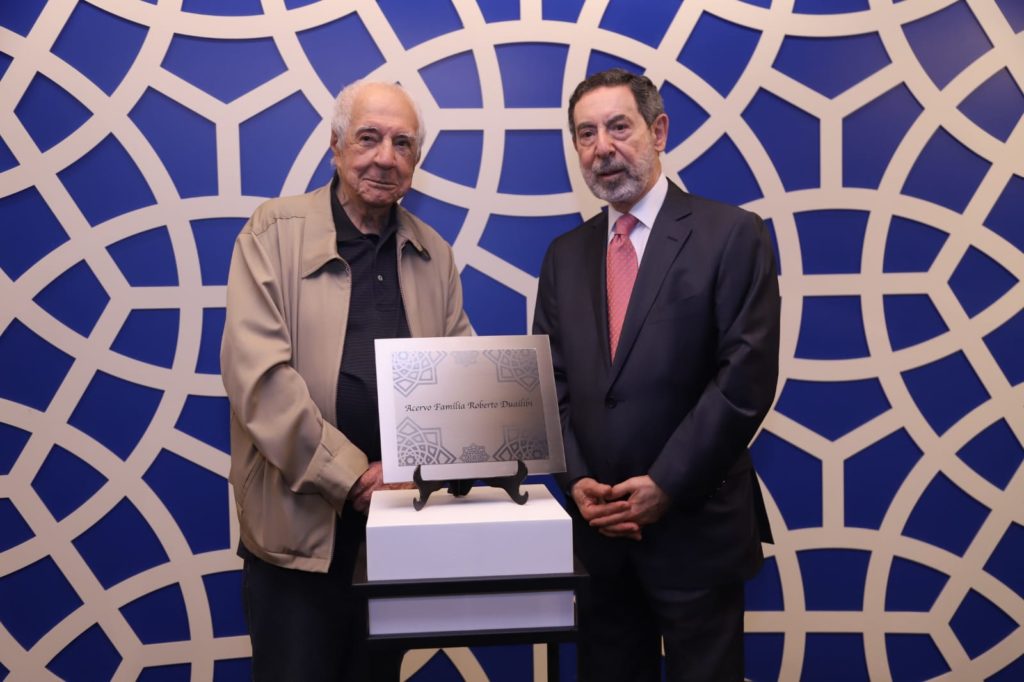São Paulo – Brazilian advertising executive Roberto Duailibi has donated the Duailibi family collection to the Arab Brazilian Chamber of Commerce (ABCC). Over 1,500 pieces, including books, photos, maps, documents and voice notes, recording the history of the Lebanese Brazilian family and the Arab immigration to Brazil, are part of the donation. They will be under the care of the Arab House, a center for the institutional and cultural development of the Arab-Brazilian relations that is affiliated to the ABCC. Pictured above, Roberto Duailibi (L) and ABCC president Osmar Chohfi (R).

The material delivery was formalized in an event for a select number of guests at the ABCC on Tuesday (14). The pieces will be stored at the entity’s library, as the Arab House operates only from its digital version for now. The ABCC facilities at the Paulista Avenue were designed by architect Ruy Ohtake, and the library will be overhauled to house the records of the Duailibis. The collection will soon be made available to the public.
“We’ll treat it with the same care that Roberto devoted to it. We’ll try to make it accessible to descendants that seek information on their origins, as well as Brazilian and foreign scholars and everyone interested in learning something about an age-old society that has contributed so much to the world’s culture, sciences and humanities,” ABCC president ambassador Osmar Chohfi said.

The collect of the material over the years was spearheaded by Roberto in a project called FamilyD Studies Center. During the ceremony of the donation of the collection, the executive addressed the beginning of the initiative. One of the first insights came from the story that his brother used to tell about meeting a young lady called Duailibe with an “e.” “We got curious about where the other Duailibis were,” Roberto explained. It’s believed that all Duailibis, Duailbs, Dawalibis, Daualibis and other spellings have the same origin.
In addition to the young lady, other two factors led to the FamilyD project. Roberto used to study the social media concept at the School of Sociology and Politics even before the Internet. “How many people do you have to know to get in touch with someone that interests you?” he explained on the social media concept from those times. Added to this, the advertising agency Roberto worked at had to make a list of all passengers who were at the first São Paulo-Rio de Janeiro flight of the VASP airliner and managed to do so. “That encouraged me to do the same with the family – where they were, how did they came, what relations they had between them.”

Roberto’s first step was sending a short survey to the Duailibis he knew. “I decided to put into practice what I had learned at the School of Sociology and Politics,” he said. So the D family network started to take shape. Then came the purchase of books on the history of Lebanon, Syria, the Middle East and Arabic, the acquisition of maps, the audio interviews with the first Duailibi immigrants to arrive in Brazil, and the collection got bigger. Up to now, the material was sitting in an apartment in the city of São Paulo.
“At first, the intention was writing a book, but then came the Internet and making a website became much easier,” the executive said. On the FamilyD website you can find iconography, news, videos, reports from immigrants and descendants, pictures, family tree, and plenty of material on the history of the family and the Arabs. The research has eventually crossed Brazil’s borders and added records of Duailibis from other countries to the collection.
New home

But the apartment got too small for the size of the collection, and Roberto found in the ABCC a new home for the material. Talks had started during the previous administration under president Rubens Hannun, a childhood friend of the advertising executive, and continued with the current president Osmar Chohfi, with whom Roberto unveiled the plaque that will stay at the library indicating the presence of the collection. The excitement shown by the ABCC leaders in receiving the collection influenced his choice, Roberto said. The executive retained only the statues.
ABCC Cultural director Silvia Antibas said she saw a great generosity in the donation and the reception. “It’s very generous of the family to donate and very generous of the ABCC to receive,” she said. The director added that they aim to make the collection available to all. “We want no stored books,” she said. Antibas said that the material will also be digitized as part of the digitization project on the memory of Arab immigration to Brazil that the ABCC carries out with the Holy Spirit University of Kaslik (USEK) in Lebanon.
The publicist

Roberto Duailibi is one of the most important Brazilian publicists. He was one of the creators of one of Brazil’s largest and most award-winning advertising agencies. He is a professor, sociologist, lecturer, author of books that marked the Brazilian advertising history, and a member of the Academy of Literature of São Paulo. Chohfi described him as a symbol of the Lebanese and Arab Brazilian community. “The success of Roberto and his family is our success, to, as it projects the best that the Lebanese, Syrians and Arabs in general could bring for the progress of the Brazilian society,” the president said.
This Tuesday’s event was attended members of the Duailibi family, members of the Arab community in Brazil, and leaders of the ABCC such as secretary-general & CEO Tamer Mansour, Marketing & Communication director Silvana Gomes, International Relations vice president Mohamad Orra Mourad, director Claudia Haddad, director William Atui, former chairman Walid Yazigi, and former president Rubens Hannun. The event was also attended by the general consul of Lebanon in São Paulo Rudy El Azzi, TV Cultura president José Roberto Maluf, and Federation of Muslim Associations in Brazil (FAMBRAS) chair Ali Zoghbi, among other executives and authorities.
Translated by Guilherme Miranda




